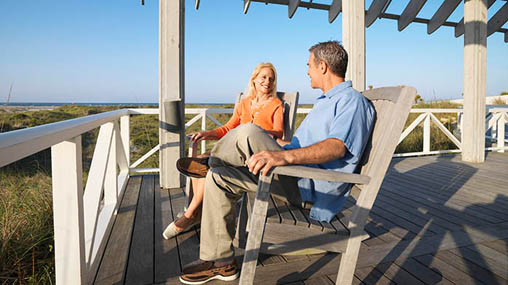
Earn cash back
after close!
With Home Connect, you could earn $350 to $9,500 cash back after close.
Is a vacation home on your wishlist? These tips can help you make a smart and confident choice before you buy.
You’ve been going to that shore town or mountain lake for years. Now you’re ready to take the next step: buying a vacation home in the place you already know and love. Whether it’s for personal enjoyment now or your retirement in the future, buying a second property can be a rewarding and meaningful investment. Before you pick out paint colors or plan your first sunset dinner, let’s walk through the key steps and financial considerations to help you move forward with confidence.
How to Buy a Vacation Home
From researching the perfect location to planning for ongoing expenses, here are five steps to help transform your vacation home vision into a reality.
Step 1: Choose the right location
As they say, location is everything in real estate, and that certainly applies to vacation homes. And while you’ve probably imagined the setting already, now it's time to make sure it fits your life. To help pinpoint the best vacation home location for you, you’ll want to think about the following:
- Your preferences. Whether you already have a special spot in mind or you’re still exploring options, think about what kind of setting fits your lifestyle. Do you have your heart set on the beach, the mountains or maybe a walkable city escape?
- Seasonality and climate. Will your home be accessible and enjoyable year-round, or is it more of a seasonal locale? Are there potential risks like hurricanes, wildfires or flooding that could impact both your experience and insurance costs?
- Proximity to amenities and attractions. Check out nearby amenities like restaurants, grocery stores, pharmacies, shops and outdoor activities. Look for offerings that match your lifestyle and consider convenience if you plan to host guests or spend extended time at the property.
- Logistics. Factor in how often you’ll realistically use your vacation home and compare the cost per visit to what you’d usually spend on hotels or rentals. Is the area within easy driving distance, or will getting there require flights — and if so, are they direct? A property within easy reach can become a favorite escape, while one that’s harder to get to may end up being underused and more costly than expected.
- Safety and healthcare access. Peace of mind matters. Research local safety and crime data. Also, verify that there is reliable access to healthcare nearby, especially if your vacation home will host children, seniors or anyone with medical needs.
- Housing costs. Understand average prices, taxes and property values in your desired location. Use online tools to dig into trend data.
- Community and culture. Every area has its own personality. Choose a location that fits how you like to spend your time, whether you prefer a remote retreat or an active and vibrant social scene.
Step 2. Understand all the costs involved
Buying a vacation home is exciting, but like any property, it comes with ongoing expenses. Knowing the full cost of ownership can help you make a smart, confident decision and avoid budget surprises down the road.
In addition to the purchase price and closing costs, be sure to factor in:
- Property taxes (which may be higher for second homes)
- Utilities
- Insurance
- Homeowners association (HOA) fees, if applicable
- Travel expenses to and from the property
- Maintenance and repairs
Step 3: Plan for Ongoing Maintenance
For most buyers, a vacation home is a place to relax, recharge and spend quality time with family and friends. Keep that goal in mind, but remember that even a low-maintenance second home will still require ongoing care.
Routine upkeep like landscaping, appliance repairs and seasonal maintenance is part of the package with any home. But some of the attributes that make a location so appealing — like snowy winters, salty ocean air, desert heat or tropical humidity — can also increase wear and tear. These conditions may lead to higher home upkeep costs over time.
If you won’t be there year-round, think about how you’ll manage maintenance remotely. Will you hire a local property manager or contractor to help with regular upkeep or emergency repairs? Planning ahead can help you preserve the home’s value and keep it ready for your next visit.
Step 4: Decide How to Pay for It
If you're not buying your vacation home with cash, you'll need to explore financing options that apply to second homes:
- Conventional loans. Conventional home loans for second homes typically require a down payment of at least 10%, though requirements may vary. To avoid mortgage insurance, you’ll generally need to put down 20%.
- Jumbo loans. Designed for higher-priced homes, jumbo mortgages offer loan amounts up to $3 million but come with stricter requirements.
- Home equity loans or cash-out refinancing. If you have significant equity in your primary residence, you may be able to tap into it to help finance your vacation home. A home equity loan provides a lump sum with a fixed interest rate, while cash-out refinancing replaces your existing mortgage with a new, larger one.
Step 5: Think Long-Term
A vacation home should bring joy today and flexibility for tomorrow. It’s wise to think beyond the next few years. Could this eventually become your part-time home or your full-time retirement residence? Ask yourself:
- Will this home still fit your lifestyle in 10-15 years?
- Do you want to pass the home down to your family?
- What’s the resale outlook in this area?
Should You Buy a Fixer-Upper?
You’ve zeroed in on where you want to be and what you can comfortably spend. The next step? Figuring out if you’re looking for a move-in-ready home or if you're up for a bit of a project.
The rise of home renovation television shows has made many homeowners eager to transform rough diamonds into vacation home jewels. Is a fixer-upper right for you? It depends on your goals, budget and tolerance for surprises.
A worthwhile fixer-upper often includes:
- Cosmetic updates like outdated kitchens or bathrooms
- Worn flooring or finishes
- A neglected yard or exterior that needs a refresh
- Unfinished basement
- Aging but functional appliances or windows
These types of improvements are typically manageable in terms of time, cost and complexity. Strategic upgrades like these may also increase the home’s value and simplify ongoing maintenance.
Be cautious if the property shows signs of:
- Roof damage or leaks
- Foundation cracks or shifting
- Old or unsafe electrical and plumbing systems
- Evidence of mold, pests or water intrusion
If you find a fixer-upper that could be promising, be sure to get a detailed home inspection and consult licensed contractors to estimate repair costs. Ask about required permits for major work, as these can affect both your timeline and budget. Also confirm whether any updates will be needed to bring the home up to code or meet current safety standards, especially for electrical, plumbing or structural systems.
The more informed you are, the better equipped you’ll be to decide whether the project is worth the time, money and effort. A fixer-upper can be a rewarding investment, but only if the repairs don’t outweigh the payoff.
Is a Vacation Home Right for You?
Buying a vacation home can be a fulfilling way to create lasting memories. To make the most of your purchase, it’s important to understand your goals and choose a place that fits both your lifestyle and long-term plans — somewhere you’ll want to return to again and again. If you’re ready to make the move to a second home purchase, talk to a Pennymac Loan Expert and let us help you find ways to finance your new property.
Share
Categories





